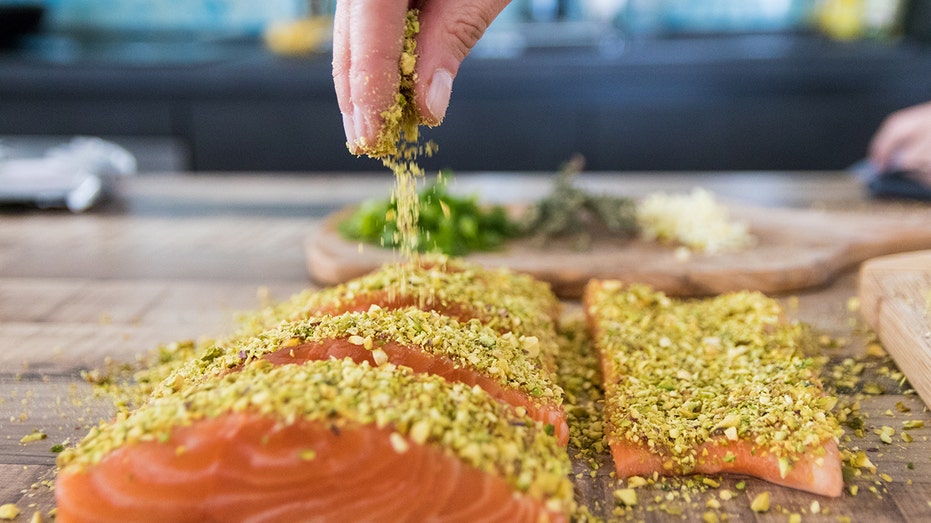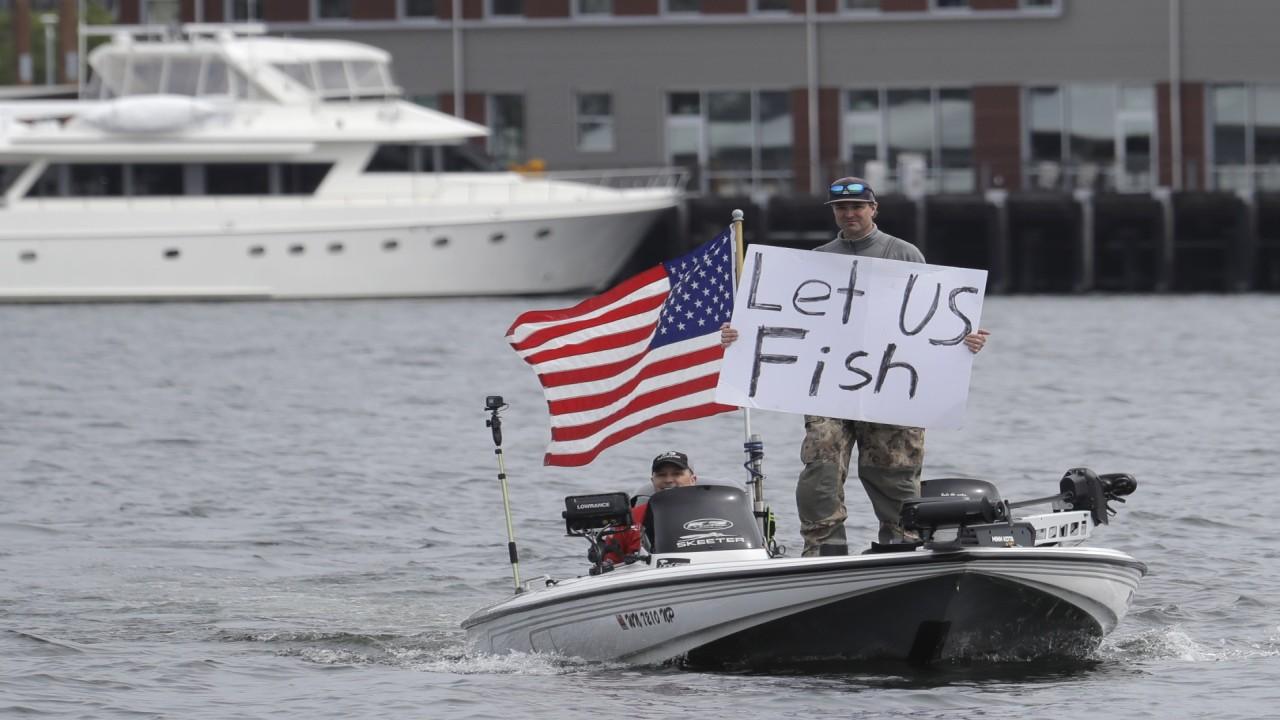Coronavirus sees Americans cooking more seafood, but fishermen are struggling
Without restaurant orders keeping them afloat, seafood companies are trying new lures to get fish on people’s plates
Get all the latest news on coronavirus and more delivered daily to your inbox. Sign up here.
The coronavirus crisis is hitting seafood businesses even harder than the meat industry, prompting fishermen and processors to overhaul their operations and look for new customers.
U.S. supermarket shoppers are buying more fish and shellfish to prepare at home during quarantine, but business owners say the rise isn't enough to offset the loss of sales to restaurants, where 70% of seafood is consumed, according to market-research firm Urner Barry.

Fishermen are still struggling to stay afloat amid coronavirus despite more people cooking seafood at home.
Captains across the country have docked vessels and distributors have rerouted what fresh fish they can into freezers, sometimes destroying the rest. Prices for items like lobster tails and salmon have plummeted as costs climb for processors trying to prevent the virus from spreading in seafood plants as it has in slaughterhouses.
AMID CORONAVIRUS, FISHERMEN RETURN FROM THE SEA WITH BIG CATCH, NO PLACE TO SELL
Seafood purveyors are marketing more fish to consumers and grocery stores.
Sean O'Scannlain, chief executive of Illinois-based Fortune International, once sold 70% of his seafood to restaurants. Now, he's supplying more salmon to supermarkets and shrimp to meal-kit companies like Blue Apron Holdings Inc. and HelloFresh SE.
The company is approaching 80% of its typical sales volume, Mr. O'Scannlain said, and has held on to its 500 employees, in some cases redeploying truck drivers to pack tilapia for meal kits. "We're doing whatever we can to keep busy and find new customers in a world that's been turned upside down," Mr. O'Scannlain said.
GET FOX BUSINESS ON THE GO BY CLICKING HERE
Sales at Samuels and Son Seafood Co., a Philadelphia-based supplier to restaurants, hotels and casinos, crashed 75% over a few weeks in March, said owner Sam D'Angelo. Workers stockpiled what they could in freezers, and drove 10 tons of fresh lobster, clams and mussels worth more than $100,000 to a landfill. The company laid off half of its 400 employees.
TRIDENT SEAFOODS' BOSS CHARTS SAFER COURSE FOR ALASKA FISHING SEASON
As it works to stay afloat, the company has expanded a fish market in the lobby of its headquarters and added home delivery. Samuels & Son also retooled its main processing plant to package more fillets for grocers, and created prepared meals like tuna meatballs.
"This is the art of survival," Mr. D'Angelo said.
While nearly two-thirds of seafood eaten in the U.S. is consumed outside the home, sales of other proteins, including chicken, beef and pork, are more evenly split between grocery stores and restaurants.
U.S. seafood sales at grocery stores totaled $1.4 billion for the four weeks ending on May 9, a 40% increase from a year earlier, according to Nielsen.
CORONAVIRUS PROMPTS PUBLIX TO BUY EXCESS FOOD FROM FARMERS FOR DONATIONS
The $2 trillion federal stimulus package included $300 million for the seafood industry, though companies and trade groups say the sum isn't enough. A group of 15 distributors surveyed in April by the National Fisheries Institute said they expect to lose $1.7 billion, about 40% of their annual revenue, if current conditions last through year's end. Only 20% of more than 500 aquaculture businesses surveyed in March by Virginia Tech and the Ohio State University said they would survive the next six months without outside support.
GET FOX BUSINESS ON THE GO BY CLICKING HERE
With its Seattle oyster bars shut down, Taylor Shellfish Farms, one of the nation's largest producers, is focused on boosting online sales of its oysters and clams. The company has posted oyster-shucking video tutorials and is promoting frozen oysters as a grilling option for the Memorial Day holiday.
Spokesman Bill Dewey said the company's e-commerce sales are up nine times from last year, though they don't come close to making up for lost restaurant sales. Taylor has laid off 75% of its 500 workers. It is selling a parcel of timberland and considering sales of some tidelands, too.
Some companies are also contending with coronavirus outbreaks among workers. Blue Harvest Fisheries, a fishing and processing company in Massachusetts, closed its plant for three days in April after two workers tested positive for Covid-19. The closure cost Blue Harvest $200,000, said CEO Keith Decker, who said he is also paying hourly workers an extra $1 an hour and has added costly fogging and deep-cleaning procedures at the plant each day. At the same time, he said, production is down 25% because of reduced seafood demand and worker absenteeism.
"It's a tightrope I'm walking," Mr. Decker said.
In Alaska, which makes up 60% of the nation's catch, according to the Alaska Seafood Marketing Institute, seafood companies are spending millions to prevent infection among the armies of workers they bring to the state each year. Executives say virus cases there could hobble operations and devastate remote villages.
At least two workers who traveled to the state's fishing regions for the summer already have tested positive for the coronavirus, including a worker for Trident Seafoods, the nation's largest seafood company.
Alaska officials said last week that the Trident case was discovered after several workers quarantining together in southwestern Alaska were tested at the end of the 14-day period, in accordance with regional requirements. Trident arranged for the positive worker to be transported out of the region, and the others are repeating a second two-week quarantine, the state said. Residents in the region earlier this year had urged the state to consider closing the fishery.
Greg Indreland, manager of Yakutat Seafoods, said he's spending $2,400 to quarantine each worker he brings to the 600-person village of Yakutat.
"If we get Covid into the plant, we're done," he said.
Seafood companies face difficult choices as restaurants reopen. Kim Gorton, CEO of Boston-based Slade Gorton & Co., said restaurant customers that haven't paid for previous deliveries are asking for new supplies. As she deliberates whether to extend more credit to customers on shaky ground, she said, her inventory loses value every day.
"Seafood isn't a Twinkie. It goes bad at some point," she said.




















